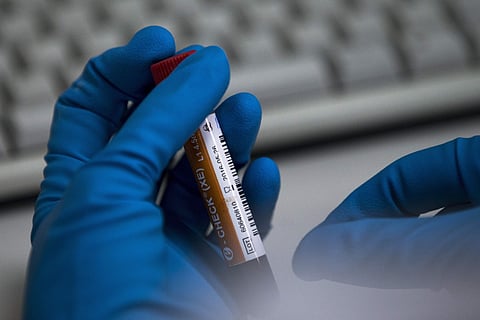

CHENNAI: In a shocking case of doping, a 14-year-old swimmer tested positive for steroids and has been handed a provisional suspension.
According to the updated provisional list (as on August 1, 2023) on the National Anti-Doping Agency Website, the minor athlete from aquatics tested positive for 19-norandrosterone, an anabolic androgenic steroid (AAS) on World Anti-Doping Agency Prohibited list. It is understood that the swimmer was part of the national team.
If this is not enough, another Asiad-bound player in Wushu tested positive. According to the NADA provisional suspension list, Owais Sarwar Ahenger is among the three wushu players who failed a dope test. The wushu player tested positive for a cocktail of drugs — 19-nor androsterone and stimulants mephentermine and its metabolite phentermine.
According to the Wushu Association of India, Owais, a national champion in 78kg, was part of the 13-member team that was supposed to leave for Hangzhou in September-October. Owais has been asked to leave the camp after the officials were notified. As for the disconcerting news of the young swimmer, the Swimming Federation of India said it was shocking that such a young athlete has tested positive. The sample apparently was collected recently. The swimmer created a record in women’s freestyle at the senior nationals held in Hyderabad in June. It needs to be seen what course the swimmer takes. For a minor, the penalty is usually diffeent and can be between a reprimand and a two-year ieligibility period.
However, since 2021, the WADA has introduced another rule wherein if the athlete “voluntarily accepts the Anti-Doping Rule Violation (ADRV) and applicable consequences within 20 days from the date of notice of charge” they will be handed a reduced ban of three years. “We are very shocked that such a young athlete has tested positive. Parents and coaches are required to be more responsible and ensure that they do not pursue performance at any cost,” said Monal Chokshi, the secretary of the SFI. It needs to be seen if the swimmer goes for a B sample test.
Perhaps, it could be the first time such a young athlete has tested positive. There have been occasions when athletes at Khelo India Youth Games and junior nationals have tested positive, but not too many athletes have been tested under 16.
In the case of minor athletes, experts felt the authorities must hold coaches and parents responsible because at this age athletes hardly know anything about doping. Even if it is contaminated supplements, wards and coaches must be aware of what the athlete is consuming. Ashok Ahuja, former head of the department of sports medicine at NIS Patiala and an anti-doping expert, said that the positive test is not surprising and that there should be more testing in the junior and sub-junior levels. He felt that authorities are aware of such abuse at the grassroots. “It is not very surprising because we are aware of it,” he said,
“There are quite a number of youngsters at the grassroots level who are adopting such unfair means and I am sure it could be with the consent of their coaches and even parents also know about it.” However, the veteran doctor felt that it would adversely affect the health of youngsters. “It depends on the salt the child has consumed,” he said. “For anabolic steroids, it has very serious side effects not only in terms of liver damage, hypertension and heart problems but it leads to stunted growth in adolescents. This is very serious.” He also said that it affects the growth of the articular system of the body. Articular system consists of the joints of the body and the surrounding tissues. “The bone growth is still taking place at this age and that gets stunted,” he said.
Two more wushu players who tested positive and were provisionally suspended are Shavi Dahiya and Mukul. The two are national medallists as well. Shavi tested positive for Selective Androgen Receptor Modulators (SARMS) ligandrol. As reported by this newspaper earlier, SARMS was developed to treat elderly patients suffering from muscle and nerve damage and is illegal to buy anywhere in the world as the American company producing it is still to be approved for human consumption. Mukul tested positive for the steroid stanozolol. Both athletes are staring at four-year bans. There is a fencer who tested positive for 19-norandrosterone. Quarter-miler Anjali Devi still figures on the provisional suspended list.